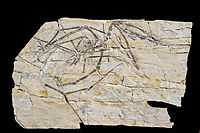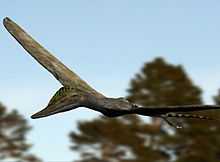Wukongopteridae
| Wukongopterids Temporal range: Middle?-Late Jurassic, 154Ma | |
|---|---|
 | |
| Fossil specimen of Darwinopterus modularis | |
| Scientific classification | |
| Kingdom: | Animalia |
| Phylum: | Chordata |
| Order: | †Pterosauria |
| Clade: | †Monofenestrata |
| Family: | †Wukongopteridae Wang et al., 2009 |
| Type species | |
| Wukongopterus lii Wang et al., 2009 | |
| Genera | |
The Wukongopteridae are a group of basal pterosaurs, found exclusively in China. It contained in 2010 five species in four genera, all collected from the Tiaojishan Formation and/or Daohugou Beds, which may date to the middle Jurassic period,[1] though other studies have given a date of late Jurassic, and a few give an early Cretaceous date.[2][3]
The Wukongopteridae were first named by Wang et al. in 2009, not yet giving an exact definition.[4] The clade Wukongopteridae was first defined by Wang et al. in 2010 as "the most recent common ancestor of Wukongopterus lii and Kunpengopterus sinensis, and all of its descendants". According to Wang et al. (2010) Wukongopterus lii, Darwinopterus modularis, Darwinopterus linglongtaensis, Kunpengopterus sinensis and Changchengopterus pani are wukongopterids.[5]
Description

Wukongopterids are characterized by a unique combination of "primitive" and advanced pterosaurian features. While they had long tails and other features characteristic of other "rhamphorhynchoids", they also had distinct pterodactyloid features, such as long vertebrae in the neck and a single skull opening in front of the eyes, the nasoantorbital fenestra (in most "rhamphorhynchoids", the antorbital fenestra and the nasal opening are separate).[5] This feature lead to Darwinopterus modularis being placed by Lü e.a. in a new clade of pterosaurs, the Monofenestrata, or "with a single opening", forming this group together with the true Pterodactyloidea, to the exclusion of the Rhamphorhynchidae and other more primitive pterosaurs which had separate nasal and antorbital fenestrae. However, according to Wang e.a. it is equally possible that the Wukongopteridae formed a more basal group, below the Rhamphorhynchidae.[5]
References
- ↑ Lü, J., Unwin, D.M., Jin, X., Liu, Y. and Ji, Q. (2010). "Evidence for modular evolution in a long-tailed pterosaur with a pterodactyloid skull." Proceedings of the Royal Society B, 277(1680): 383-389. doi:10.1098/rspb.2009.1603 PMID 19828548
- ↑ Yuan, Wang and Evans, Susan, "A new short-bodied salamander from the Upper Jurassic/Lower Cretaceous of China", Acta Palaeontological Polonica 51 (1): 127-130, 2006
- ↑ Fucheng Zhang, Zhonghe Zhou, Xing Xu, Xiaolin Wang & Corwin Sullivan, "A bizarre Jurassic maniraptoran from China with elongate ribbon-like feathers", Nature 455, 1105-1108 (23 October 2008). The authors note that "The age of the Daohugou sediments is contentious, with possible dates ranging from Middle Jurassic to Early Cretaceous. However, published radioisotopic dating results span a narrower range from 152 to 168 Myr (Middle to Late Jurassic)"
- ↑
- Wang X., Kellner, A.W.A., Jiang S., and Meng X., 2009, "An unusual long-tailed pterosaur with elongated neck from western Liaoning of China", Anais da Academia Brasileira de Ciências 81(4): 793-812
- ↑ 5.0 5.1 5.2 Wang, Xiaolin; Kellner, Alexander W.A.; Jiang, Shunxing, Cheng, Xin, Meng, Xi & Rodrigues, Taissa (2010). "New long-tailed pterosaurs (Wukongopteridae) from western Liaoning, China" (PDF). Anais da Academia Brasileira de Ciências 82 (4): 1045–1062. doi:10.1590/S0001-37652010000400024.